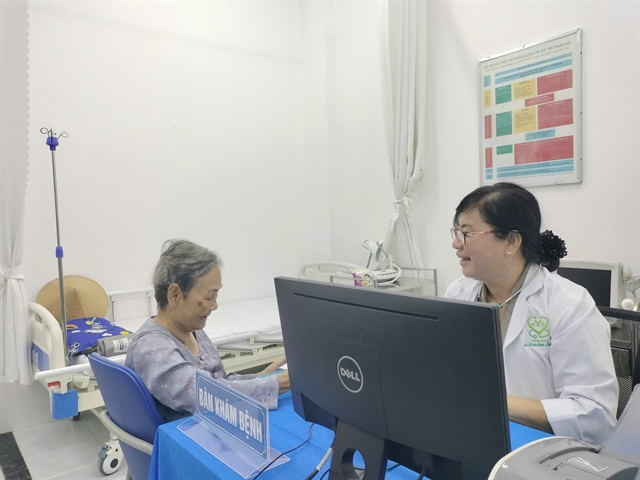Cần Thơ is expanding its family doctor clinic model to provide residents with continuous and comprehensive healthcare services.

A local resident receives medical check-ups at the family doctor clinic in Thạnh Tiến Commune in Cần Thơ City’s Vĩnh Thạnh District. — VNA/VNS Photo Ánh Tuyết
CẦN THƠ — Cần Thơ is expanding its family doctor clinic model to provide residents with continuous and comprehensive healthcare services.
The Cửu Long (Mekong) Delta city has opened seven family doctor clinics after six months of implementing the model, according to its Department of Health.
It aims to open 15 more family doctor clinics this year.
Hoàng Quốc Cường, director of the department, said the clinics provide primary healthcare, disease prevention, health promotion, emergency services and general treatment following family medicine principles.
They serve both individuals and households, following guidelines set by the Ministry of Health, he said.
At present, most people do not receive consistent healthcare from birth to death and often lack knowledge about how to prevent illness. When health problems arise, many choose to visit higher-level hospitals, causing overcrowding and raising travel and living costs.
To address this, the Ministry of Health launched the model of family doctors and family doctor clinics.
In Cần Thơ, the Department of Health has instructed each district to set up one family doctor clinic at a commune-level primary healthcare centre and another at the district-level centre.
It has instructed city-level hospitals to work closely with local healthcare centres and capable organisations to provide check-ups at family doctor clinics. The aim is to strengthen the capacity of primary healthcare centres and to build professional links between hospitals of different levels.
At the Trung Nhứt Ward primary healthcare centre in Thốt Nốt District, the department has established a family doctor clinic.
The clinic is equipped with modern medical devices to provide basic healthcare services to residents. Equipment includes an ultrasound machine, electrocardiogram (ECG) machine, nebuliser, SpO₂ monitor, adjustable hospital bed, and blood glucose meter.
The clinic has 10 staff members, including a pharmacist, a nurse, a doctor specialised in family medicine, a preventive medicine doctor, and a general practitioner certified in ultrasound.
It will expand its range of technical services to align with local disease patterns and ensure the coverage of the basic healthcare service package in the future.
It will strengthen co-operation with Thốt Nốt District General Hospital and higher-level hospitals in processes such as sample collection and the return of test results under a “one-stop” model.
It will also provide health check-ups and maintain health records for local residents, with an initial focus on chronic and non-communicable diseases.
Nguyễn Khoa Nam, head of the Thuận Hưng Commune primary healthcare centre in Thốt Nốt District, said that since the family doctor clinic was established at the centre in October 2024, the centre has received an average of 100 residents daily for consultations.
Previously, it only received around 10 patients per day, he added.
Lại Thị Bé Ba arrived at the family doctor clinic in the Thuận Hưng Commune primary healthcare centre for a check-up on her high blood pressure and received a thorough examination from the doctor.
“The doctor not only conducted a meticulous examination but also provided detailed advice on medication use, and was always very friendly and attentive,” she said.
The family doctor clinic model in Cần Thơ has received positive feedback from the community in its early stages.
Cường said that, with the implementation of this model, the department aims to provide the most accessible healthcare services to residents.
With convenient locations, modern facilities, affordable costs, and simple procedures, family doctor clinics make it easier for people to access check-ups and treatment for common illnesses, he said, adding that this helps reduce missed opportunities for medical care due to reluctance to travel long distances or the burden of high costs.
The department is working closely with various agencies to finalise solutions and propose pilot mechanisms, such as the privatisation of certain services, to boost revenue for primary healthcare centres and help retain medical staff within the public system. — VNS